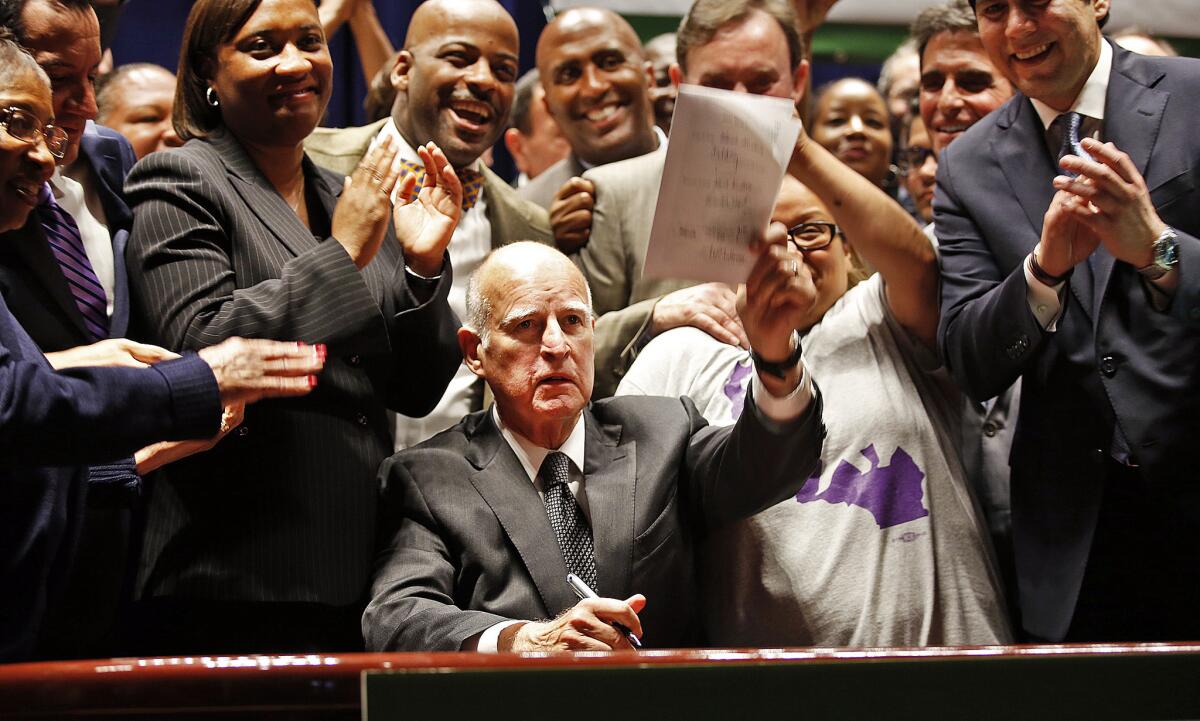Democrats think this might be the year that Gov. Jerry Brown loosens his grip on state spending

Gov. Jerry Brown holds the signed copy of the minimum wage bill at the Ronald Reagan State Building in Los Angeles.
- Share via
Reporting From Sacramento — Gov. Jerry Brown has long warned that the state’s budget bonanza of recent years, fueled by a windfall of income tax revenues, is destined to sputter out — a mantra that’s helped deflect many of his fellow Democrats’ spending demands.
But now, even as April tax revenues missed their mark by $1 billion, there’s a perception at the state Capitol of a slight opening in Brown’s otherwise airtight argument. And it’s one he brought about himself, by embracing the new law boosting California’s minimum wage.
“I think it’s safe to say that was a surprise,” said Chris Hoene, executive director of the California Budget & Policy Center, a nonprofit group that advocates for programs aimed at low-income families. “His recent moves are adding up to some significant progress.”
In addition to signing the law to raise the minimum wage to $15 an hour over the next six years, Brown also recently acted to expand the state’s paid family leave program. Both laws have a relatively small price tag when it comes to crafting a new state budget over the next six weeks, but are likely to spark demands for even more expansive government programs and additional spending.
And yet, tax collections have hit a sour note. Officials last week estimated a 7% drop in personal income tax revenues from April 2015, especially notable given that Brown’s budget team predicted an increase from the year before.
The independent Legislative Analyst’s Office pointed to the Wall Street stock slide earlier this year as one possible explanation, given how much of the state’s revenues come from the investment portfolios of wealthy taxpayers.
The governor’s January budget, a $170.7-billion plan, assumed increased spending relative to the plan enacted last summer. Brown makes his final revisions to that spending plan this week, and will send it to the Legislature by May 15. Administration officials insist that there’s no change in Brown’s approach.
“Maintaining fiscal stability remains a paramount priority, and you can expect it to continue to be reflected in the governor’s revised budget,” said H.D. Palmer, deputy director of the state Department of Finance.
Even so, some Democrats believe that Brown has shown an increasing awareness of the need for, and perhaps even a willingness to embrace, the kind of spending that in years past would have been a non-starter.
“I’m looking for him to have a bigger vision,” said state Sen. Holly Mitchell (D-Los Angeles), one of the most vocal advocates for additional tax dollars for services including child care and welfare assistance.
Mitchell and others made careful note of the governor’s comments last month at the Los Angeles event to sign the minimum wage law.
“This is about economic justice, it’s about people, it’s about creating a little, tiny balance in a system that every day becomes more unbalanced,” Brown said at the time. “Let’s keep it going. We’re not stopping here.”
Members of the Legislative Women’s Caucus intend to take him at his word. They met privately with the governor last week to pitch their plan for $800 million in additional spending on early child care and education programs.
Mitchell, who said the governor was noncommittal, believes Brown needs to focus more on help for struggling families and their children. In particular, she has sought additional dollars for the more than 2 million children in the welfare assistance program CalWorks.
“It’s the only state program where, frankly, deep poverty is allowed to fester and continue,” she said.
Brown also will be asked over the next few weeks to support more money for affordable housing and cash payments to the blind and disabled.
Assembly Speaker Anthony Rendon (D-Paramount) said such programs could be considered consistent with the issue of justice that Brown invoked in raising the minimum wage.
“From the standpoint of a moral imperative, you can make an argument that they would all fit in that category,” Rendon said.
“Does that move the governor?” he asked. “I don’t know.”
The path through the maze of budget politics also includes higher expenses from Brown’s own administration. Since the governor unveiled his budget proposal in January, 126 new spending requests have been approved by the state Department of Finance. They include an extra $445,000 for a California Highway Patrol radio system and a $6.3-million request for a courthouse construction project in Santa Barbara County. Last week, he signed an emergency measure providing counties with $16.3 million to help cover costs related to this year’s elections.
Republicans intend to push for policies tightening the state budget’s wiggle room. Last week, state Senate GOP members called for a new tax credit for families paying college tuition and school supplies and new tax breaks for veterans.
“If the priorities are carefully weighed, I think we do have plenty of money,” said Senate Republican Leader Jean Fuller (R-Bakersfield).
For now, Brown is brushing aside questions about his willingness to use more of that money. “There are limits, there is a balance,” the governor said after signing the paid family leave expansion law last month.
Or perhaps it’s that if he is willing to budge, he doesn’t want to show his cards too soon.
“His recent moves are adding up to some significant progress,” Hoene said. “But no one knows when it’s coming.”
Follow @johnmyers on Twitter, sign up for our daily Essential Politics newsletter and listen to the weekly California Politics Podcast
ALSO:
Brown’s January budget preaches prudence
Legislature sends historic minimum wage hike to Gov. Brown
More to Read
Get the L.A. Times Politics newsletter
Deeply reported insights into legislation, politics and policy from Sacramento, Washington and beyond. In your inbox twice per week.
You may occasionally receive promotional content from the Los Angeles Times.











